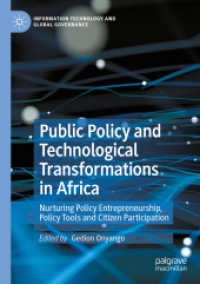- ホーム
- > 洋書
- > 英文書
- > Psychology
Full Description
The Handbook of Trust and Social Psychology highlights the crucial importance of trust in a wide variety of contexts such as individual wellbeing, societal stability and personal and professional relationships. This Handbook importantly acknowledges the profound impact of Ken J. Rotenberg's work on developmental and social psychology.
Reflecting the growing interest in the literature surrounding trust, the Handbook provides a comprehensive review of the established key theories of trust in social and social developmental psychology. Bringing together an array of esteemed experts, it explores developmental theories, interpersonal trust dynamics, societal implications, and conditions impairing trust, offering insights and future directions for understanding and fostering trust in diverse contexts. The authors of the chapters explore the nature of trust in family, romantic relationships, lies, scams and misinformation, as well as trust and testimony in court, identifying key themes that require further investigation, such as trust within the context of mental health conditions.
This Handbook is an invaluable resource for students, academic scholars, and professionals specialising in developmental, social, clinical and health psychology.
Contents
Contents
Introduction to the Handbook of Trust and Social Psychology 1
PART I SOCIAL DEVELOPMENT OF TRUST
1 Formation and change in interpersonal trust across the lifespan 9
2 A review of the basis, domain, and target framework of interpersonal trust 30
3 The relationships between trust and theory of mind: a review of the
literature and future directions 51
4 Cross-cultural comparisons of trust within adolescent sibling relationships 70
PART II TRUST IN CLOSE OTHERS
5 The nature of trust in romantic relationships 92
6 Rebuilding trust in interpersonal relationships 108
7 Trust and forgiveness in interpersonal and group relationships: a review of
the research and signposts to future directions 129
PART III TRUST IN THE SOCIAL WORLD
8 Falling for lies, scams, and misinformation: exploring the roles of
generalised trust, misplaced trust, and social intelligence in the tendency
to be gullible 150
9 Attachment security and trust within dyadic, group, sociopolitical, and
spiritual/religious relationships 164
10 Trust in emerging technologies and artificial intelligence 183
11 When trust and mistrust are misplaced: lessons from early childhood 205
12 Trust and testimony in court 226
PART IV TRUST AND PSYCHOPATHOLOGY
13 Epistemic trust and social learning: a transdiagnostic integrative model of
mental disorders and therapeutic interventions 250
14 Trust in borderline personality disorder 268
15 (Mis)trust and paranoia across the lifespan, cultures, and COVID-19 286
16 Exploring the role of trust in eating disorders and obesity 301







